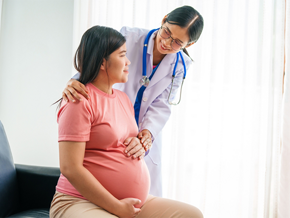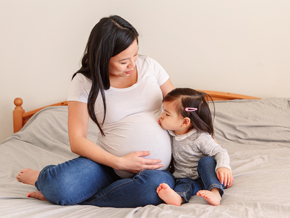
Welcome to the honeymoon period of pregnancy! You’re 13 weeks pregnant and in your second trimester, which typically runs from Week 13 to 28. Many parents find this phase the most comfortable. You might notice your morning sickness fading, your energy returning, and perhaps the first signs of a baby bump.
Learn more about your body's physical changes and baby's growth, plus tips to help you feel prepared as you continue this incredible journey.
What to Expect When You’re 13 Weeks Pregnant
People may not notice your baby bump yet, but your baby is growing rapidly!
Your baby’s development at 13 weeks
The little one in your tummy is now about the size of a peach or lemon, roughly 7 cm (2.9 in) long. At this stage, tiny bones are beginning to harden, and their intestines are settling into place inside the abdomen. Unique fingerprints are starting to form, and their vocal cords are developing. They've also begun swallowing amniotic fluid—an important first step in maturing their digestive system.
In the weeks ahead of your second trimester, your baby will continue developing vital reflexes like sucking and swallowing while all five senses begin to sharpen. By weeks 18 to 22, your baby's ears will develop enough to hear your voice, and you might even feel their first kicks and turns. Their facial muscles are also becoming more active, allowing them to make tiny expressions like squinting or frowning inside the womb!
13-week ultrasound
At 13 weeks pregnant, an ultrasound can provide a special glimpse into your baby's development and may include a nuchal translucency (NT) scan. The combined ultrasound and NT scan can help your doctor assess the risk for specific chromosomal conditions (like Down syndrome).
The ultrasound also lets your doctor check your baby’s growth, listen to their heartbeat, and make sure your pregnancy is on track.
What’s Happening to Your Body in the Second Trimester

Your second trimester brings many visible changes, from a glowing complexion to a beautiful growing baby bump.
Skin changes
You might notice that "pregnancy glow" everyone talks about. This is thanks to increased blood flow and hormonal changes, giving your skin a more radiant appearance. At the same time, you might also see skin changes like linea nigra (a dark line down your abdomen), melasma (dark patches on your face), or even stretch marks starting to appear on your belly, breasts, or hips.
Weight gain
In the second trimester, a steady gain of about half a kilogram (one pound) per week is typical, but this amount can differ based on your health and your weight before pregnancy. Your doctor can help you determine the right weight gain goals for your body.
Breast and belly growth
Your breasts will likely continue to grow and may feel tender in preparation for breastfeeding. At the same time, your uterus is stretching and growing for your developing baby, which is why your 13-week baby bump will become more noticeable.
All bodies are different, though, and how soon you show can depend on factors like your build, the position of your uterus, and if it’s your first pregnancy.
Increase in vaginal discharge
You may also experience an increase in clear or whitish, odorless vaginal discharge (leukorrhea), which helps protect the birth canal from infection. If you see a change in color, consistency, or odor, or if you experience itching or burning, call your ob-gyn.
Emotional shifts
While many experience a mood lift, hormonal fluctuations can still lead to emotional ups and downs. Things like fatigue and sleep quality can also play a big role in how you feel. A 2024 study on pregnant women (up to 14 weeks) found that poor sleep quality had the strongest link to feelings of anxiety.
When you're on an emotional roller coaster, you need to prioritize your rest, talk to your partner or a friend, and let your doctor know if you're feeling overwhelmed.
Second Trimester Pregnancy Symptoms
As your body continues to support your growing baby, you might experience the following second-trimester symptoms:
Headaches
Getting headaches during your second trimester may be due to hormonal changes, dehydration, fatigue, or even caffeine withdrawal.
Remember to stay well-hydrated, get plenty of rest, and try relaxation techniques.
Lower back pain
As your uterus expands and your posture shifts to accommodate your growing belly, you might begin to feel aches in your lower back. This is one of the most common symptoms of pregnancy.
A 2024 study published in the Journal of Health and Rehabilitation Research found that over 76% of pregnant women experience low back pain, and for many, it most frequently begins during the second trimester.
To help manage this discomfort, focus on practicing good posture, wearing supportive shoes, and considering gentle exercises like prenatal yoga or swimming.
Round ligament pain
You might feel sharp, jabbing pains or a dull ache in your lower abdomen or groin, often when you change positions suddenly. This round ligament pain is due to the stretching of ligaments supporting your growing uterus.
You can manage this by moving slowly, especially when standing up or turning. Gentle stretching might also help.
Congestion or nosebleeds
Increased blood volume and hormonal changes can cause the mucous membranes in your nose to swell, leading to stuffiness (pregnancy rhinitis) or even nosebleeds.
Use a humidifier, try saline nasal sprays, and stay hydrated to help with the stuffiness. For nosebleeds, pinch your nostrils together and lean slightly forward.
Your Nutritional Needs

Bananas are a great pregnancy snack! They're full of potassium and give you a quick, healthy energy lift.
As your baby grows rapidly, your energy needs change, so a well-balanced diet is vital. Boost your nutrient intake with local options like malunggay (moringa), bananas, and boiled eggs. Fish is another excellent source of protein and healthy fats—just avoid those high in mercury. Instead, enjoy safer, low-mercury varieties like hito (catfish), tilapia, sardines, and salmon.
Must-have nutrients
Don't forget these key nutrients, especially important during pregnancy:
- Iron is vital to prevent anemia and support your baby's blood development. You can find more information on iron-rich foods here.
- Calcium is essential for your baby’s developing bones and teeth, as well as your bone health. Explore the importance of calcium during pregnancy.
- DHA (Docosahexaenoic Acid) is an omega-3 fatty acid that's crucial for your baby’s brain and eye development. Learn about striking the right balance with DHA and ARA.
- Folate is necessary before and during pregnancy to help prevent neural tube defects and keep the baby healthy.
- Protein supports the growth of your baby’s tissues and organs.
Tips to Stay Comfortable and Healthy
As your body changes, making just a few adjustments can significantly improve your comfort levels.
- Try sleeping on your left side for better blood flow, and use pregnancy pillows for extra support.
- Embrace light exercise, such as walking, swimming, or prenatal yoga. Ask your doctor if it’s safe for you before starting.
- Practice simple relaxation techniques, such as deep breathing, meditation, or taking quiet m
- Moisturize your growing belly, hips, and breasts regularly to help with any dryness or itchiness.
- Choose supportive clothing and well-fitting maternity bras for your changing body.
Prenatal Milestones to Prepare For
As you continue your journey through the second trimester, you’ll also begin to prepare for key medical checks. These include the 20-week anatomy scan to see your baby’s detailed development and a glucose screening test to check for gestational diabetes.
It's also the natural time to start thinking ahead—planning for your baby's arrival, including your birth plan, newborn essentials, and a baby-safe home. Being 13 weeks pregnant is just the beginning of an incredible new chapter. Embrace all the changes, listen carefully to your body, and truly enjoy this special and transformative time.
Connect with other parents on the ParentTeam Moms and Dads Facebook group and share your experiences being 13 weeks pregnant.
References
Cleveland Clinic. "Fetal Development." Cleveland Clinic. Last reviewed March 19, 2024. Accessed June 5, 2025. https://my.clevelandclinic.org/health/articles/7247-fetal-development-stages-of-growth.
Cleveland Clinic. "Pregnancy: Second Trimester." Cleveland Clinic. Last reviewed September 26, 2024. Accessed June 5, 2025. https://my.clevelandclinic.org/health/articles/16092-pregnancy-second-trimester.
Cleveland Clinic. "Round Ligament Pain." Cleveland Clinic. Last reviewed March 29, 2024. Accessed June 5, 2025. https://my.clevelandclinic.org/health/symptoms/21642-round-ligament-pain.
Johns Hopkins Medicine. "The Second Trimester." Johns Hopkins Medicine. Accessed June 5, 2025. https://www.hopkinsmedicine.org/health/wellness-and-prevention/the-second-trimester.
Mayo Clinic. "2nd Trimester Pregnancy: What to Expect." Mayo Clinic. February 7, 2025. Accessed June 5, 2025. https://www.mayoclinic.org/healthy-lifestyle/pregnancy-week-by-week/in-depth/pregnancy/art-20047732.
Mayo Clinic. "Fetal Development: The Second Trimester." Mayo Clinic. March 18, 2025. Accessed June 5, 2025. https://www.mayoclinic.org/healthy-lifestyle/pregnancy-week-by-week/in-depth/fetal-development/art-20046151.
National Health Service. "Week 13." NHS. Accessed June 5, 2025. https://www.nhs.uk/start-for-life/pregnancy/week-by-week-guide-to-pregnancy/2nd-trimester/week-13/.
National Institute for Public Health and the Environment. "The NIPT and the 13-week and 20-week Scans." PNS.nl. Accessed June 5, 2025. https://www.pns.nl/en/multiple-languages/english/nipt-and-13-and-20-week-scans.
The Mother Baby Center. "Understanding and Navigating Pregnancy Emotions." The Mother Baby Center. September 9, 2024. Accessed June 5, 2025. https://www.themotherbabycenter.org/blog/2024/09/pregnancy-emotions/.
Tommy's. "13 Weeks Pregnant: Baby's Development, Constipation and Healthy Eating." Tommy's. Last reviewed July 11, 2022. Accessed June 5, 2025. https://www.tommys.org/pregnancy-information/im-pregnant/pregnancy-week-by-week/13-weeks-pregnant.




























